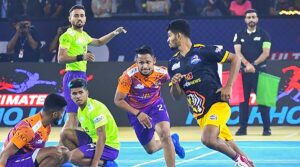The Ultimate Kho Kho league kicked off with six franchises – Gujarat Giants, Telugu Yoddhas, Chennai Quick Guns, Rajasthan Warriors, Odisha Juggernauts and Mumbai Khiladis – all set to participate in a competition taking place over 22 days until September 4.
Written by Shashank Nair |

A few years ago, Ultimate Kho Kho (UKK) CEO Tenzing Niyogi was in Ichalkaranji, a town in Kolhapur district of Maharashtra. There for a festival, Niyogi witnessed a crowd of around a lakh watching a game of kho-kho when an idea struck him. With the perfect camera angles – designed specifically to capture a sport like no other – kho kho could become the next kabaddi. An indigenous sport – played largely at the grassroots – with the potential to become a national juggernaut.
On Sunday, at the Balewadi Stadium in Pune, that idle thought, borne in the midst of a huge crowd, was turned into reality. The Ultimate Kho Kho league kicked off with six franchises – Gujarat Giants, Telugu Yoddhas, Chennai Quick Guns, Rajasthan Warriors, Odisha Juggernauts and Mumbai Khiladis – all set to participate in a competition taking place over 22 days until September 4. Players from a 143-strong draft were picked up by the teams last month with Category A players earning Rs 5 lakh for Season 1 of the league.
Niyogi’s initial idea was to simply place a mud court in an indoor arena. But that encountered a problem they hadn’t thought of – sweat. Kho-kho players can often be seen covered in mud. The sport has historically been played on sand and as the action would get intense, sweat from the players would literally make matters muddy.
There was also the matter of quality broadcasting. Kho-kho is an inherently fast-paced sport and the camera angles had to be perfect. For this, Niyogi invited three companies to come and almost ‘audition’ for how they would produce a show. A live spider-camera was procured, and multi-lingual commentary was announced. They even roped in Sony as the broadcaster and they convinced Niyogi to make a three-hour primetime sports show, rather than a two-hour event.
The attempt at transitioning the sport from one played on mud courts to now on mats has been challenging for the players as well. Delhi-based Vishal, a 22-year-old defender for Odisha Juggernauts, said, “The transition from mitti (mud) to mat has forced everyone to level up their game. You don’t need to apply too much strength on sand but now on the mat, we have to be extra careful because chances of injuries have increased. Even our diets are being changed so that we can adjust to the rigorous demands of the sport. On mud, your ankle doesn’t get as much grip as your body adjusts faster, so it doesn’t get twisted but on the mat that risk is there.”
Survival of the league
The biggest threat to UKK, though, is what generally happens to sports leagues in India. Apart from the Indian Premier League and Pro Kabaddi League, most leagues in the country have faced a variety of disappointments. Leagues like the Indian Volleyball League and the UBA Pro Basketball League have been replaced or are about to be replaced by newer models. Clubs in the Indian Super League (football) struggle to keep up with the financial demands bestowed upon them by the league. Watching Roger Federer play in New Delhi during the now-shut International Premier Tennis League almost feels like a dream at this point.
Lower starting base
In this scenario, UKK has gone the kabaddi way. Less money on the line, more emphasis on expanding grassroots coverage in the franchise’s respective territories, and more emphasis on growing the business.
Niyogi likes to describe them as his critical factors of success. He believed kho-kho was an indigenous sport already known to the masses of India (“Has great positioning in the emotional quotient of the audience.”). It had the scope for a little bit of change in the format (“Not every sport can be converted or tweaked, but kho-kho could.”). And there was the matter of India’s love for team sports (“Individual sports are wonderful but the stagnation of one Olympic Games to the next makes the athlete vanish from the public eye.”)
Growing club culture
When Niyogi pitched the idea of a kho-kho league to investors, he was clear about a few factors. There wouldn’t be any quick returns and the investors would need to have the stomach to incur some losses in the initial stages. He also told them that the sport would target women as a major chunk of their audience.
“By far, it is the only sport in India that enjoys more popularity among women than men. From the zila parishad level to college, it is a huge market to be tapped from an audience perspective – even though Ultimate Kho Kho is a men’s league.” (There are plans to launch a women’s league in a couple of years, adds Tenzing.)
But the line-up of owners shows where sporting business in India is heading. The Adani Group has purchased the Gujarat Giants and also owns a team with the same name in PKL. The GMR group – already having purchased the UP Yoddhas in PKL, now have the Telugu Yoddhas in UKK, along with their significant investment as co-owners in the Delhi Capitals IPL team along with the JSW group.
Despite some big names being a part of UKK, it’s the players of the league that have suddenly been catapulted into the spotlight. Take the case of Vishal, who has had to take night shifts and part-time jobs to continue playing the sport. Despite being chided by neighbours for playing a sport that wouldn’t earn him much and watching friends overtake his earnings by playing other sports, it was the freedom afforded by his family that made him continue with kho-kho.
“During the lockdown, I was working at Mother Dairy on a night shift. I would work from 6 PM to 4 AM. I got paid Rs 12,000 to load and unload heavy packages. I would then head to the park in the morning to practise and then head home to sleep.”
Now, Vishal works part-time for Amazon as a delivery executive. The part-time status allows him more time for practice but the sport is in such a nascent stage at the topmost level that he still plans on dropping packages after Season 1 of UKK. But if Niyogi’s vision of a rural sport becoming a national behemoth – a vision shared by the multinational conglomerates that have invested in it – comes true, then the likes of Vishal may feel their dream of playing kho-kho full-time as a professional is not that far away.

